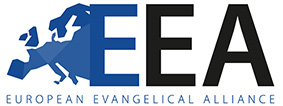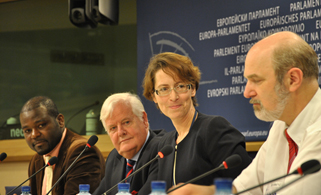Looking through the eyes of the other
In the midst of a busy plenary in Strasbourg, we spoke with Austrian Member of the European Parliament, Lukas Mandl (Vienna, 1979), about being a Christian in politics. “We should always remember that in politics, we don’t work for ourselves but for the other.”
Mr Mandl, you are a member of the European Parliament (MEP) since 2017. Where did it all start?
My political involvement started with the Austrian referendum to become a member of the European Union. That was in June 1994 and I was only 14 years old. The fall of the Berlin wall had already made a big impression on me. The changes in Eastern Europe were very present in daily life, even for me as a young boy. So, I spoke about the referendum whenever I could, encouraging people to vote for Austrian membership. At that time, I also was already elected as the class spokesperson at school and stayed involved in the school student representation. I saw every election as an opportunity to change something for the better.
Did you grow up in a politically engaged family?
My parents are definitely politically aware and very interested, but they were not members of a political party. They were not politically active in that sense. But we regularly discussed political topics. They were very open-minded, and politics was never far away. We spoke about Europe, the future of Europe, the fall of the Iron curtain, the situation in East and West. That was all part of my childhood and upbringing.
Nevertheless, you did not study politics, did you?
No, I did not. I studied Communication Sciences at the University of Vienna. Maybe I preferred to practice politics instead of studying it. While at university, I worked for two years as administrator in the office of a member of parliament. I’m very grateful for that time. But it was a part-time job, next to my studies and my activities in the youth department of the political party. Initially, I was somewhat reluctant to join a political party but I realised that if you want to serve the common good, if you want to change things, you need a party. Democracy wouldn’t work without parties.
I ran in several elections and in 2008, I was elected as a member of the state parliament of Lower Austria. After almost ten years, I began to serve as a member of the European Parliament.
What was your main motivation to join politics?
If you want to contribute to something good in this world, politics is one of some important opportunities to have an impact. In politics, everything is more focused, more present maybe than in other areas of daily life. You see fear and hope, opportunities and risks, and it is good to be aware of that in political life.
Was there a particular aspiration when you joined European politics?
Europe is a special project built on human dignity and freedom. Add history to that as well. That makes Europe really unique. It is built on the work of the founding fathers and mothers. Churchill contributed from the outside. But I also want to mention Eastern European leaders like Vaclav Havel and Lech Walesa. They all showed the importance of cooperation. But what we now see is more and more confrontation. So, when I joined the European Parliament, first of all I wanted to represent my Austrian fellow citizens, and secondly to work towards a stronger Europe, also to show to the wider world the importance of cooperation, peace, freedom, human dignity.
I would like to encourage everyone to follow a dream, contributing to something bigger than yourself.
That calling for the rest of the world is visible in the impressive list of delegations and parliamentary committees that you are a part of as well. Was there a particular reason for you to join the Delegation for the Korean Peninsula?
To be honest, that was the only one I did not really choose. Sometimes, these things just happen. I usually try to set my priorities myself, but this position was just inherited from another Austrian member who left the European Parliament. The connection to my purposely set priorities is the responsibility for foreign affairs. And I actually like it. South Korea is an interesting example of how society, life and economy can work in an Asian country. And South Korea is one of the most reliable partners of Europe you can even imagine. North Korea is of course the most important question for the security of the rest of the world.
Everything has a spiritual dimension, of course. To put it in a spiritual language, not a political one: There is a visible and an invisible world, as a popular prayer has it. This invisible world is always there. It brings the past, the present, and the future together. That knowledge is part of what leads me in my political work.
What is the biggest challenge for a Christian in politics?
Since 2019, I have initiated and been involved in organising the Strasbourg day of discourse, as I call it. There, we discuss the future and the mission of Christian democracy. Christianity is a solid foundation for freedom and human dignity. There are Christians in different political groups and there is not one ultimate Christian answer to any political question. Based on the same Christian foundation, we can still come to different conclusions and political standpoints. And we have to respect that. Or as Ignatius of Loyola taught us: “Every good Christian should be more willing to save his neighbour’s testimony than to condemn it.” This is especially important in this time of disinformation, conspiracy theory, and of division.
For us, Christians, it is important to always try to see the world through the eyes of the other. In politics, we are not called to work for ourselves. We are called to work for others. Therefore, we need to remain connected even with people with totally different opinions.
Robert Schuman once taught that for a good politician three things are important: a good sense of humour, the ability to de-dramatise, to de-escalate, and the power not to strike back. For me personally, the first and the last are my biggest challenge.
How does that work out in practice?
Well, I can only decide on my own behaviour, my own values, my personal principles, and my political priorities. I can be misled in all three. That’s why I need to stay open minded, listening, observing, to see the world through the eyes of others.
Politics is an important way of giving hand and feet to the calling to love each other. That’s why every Christian should take politics seriously.












